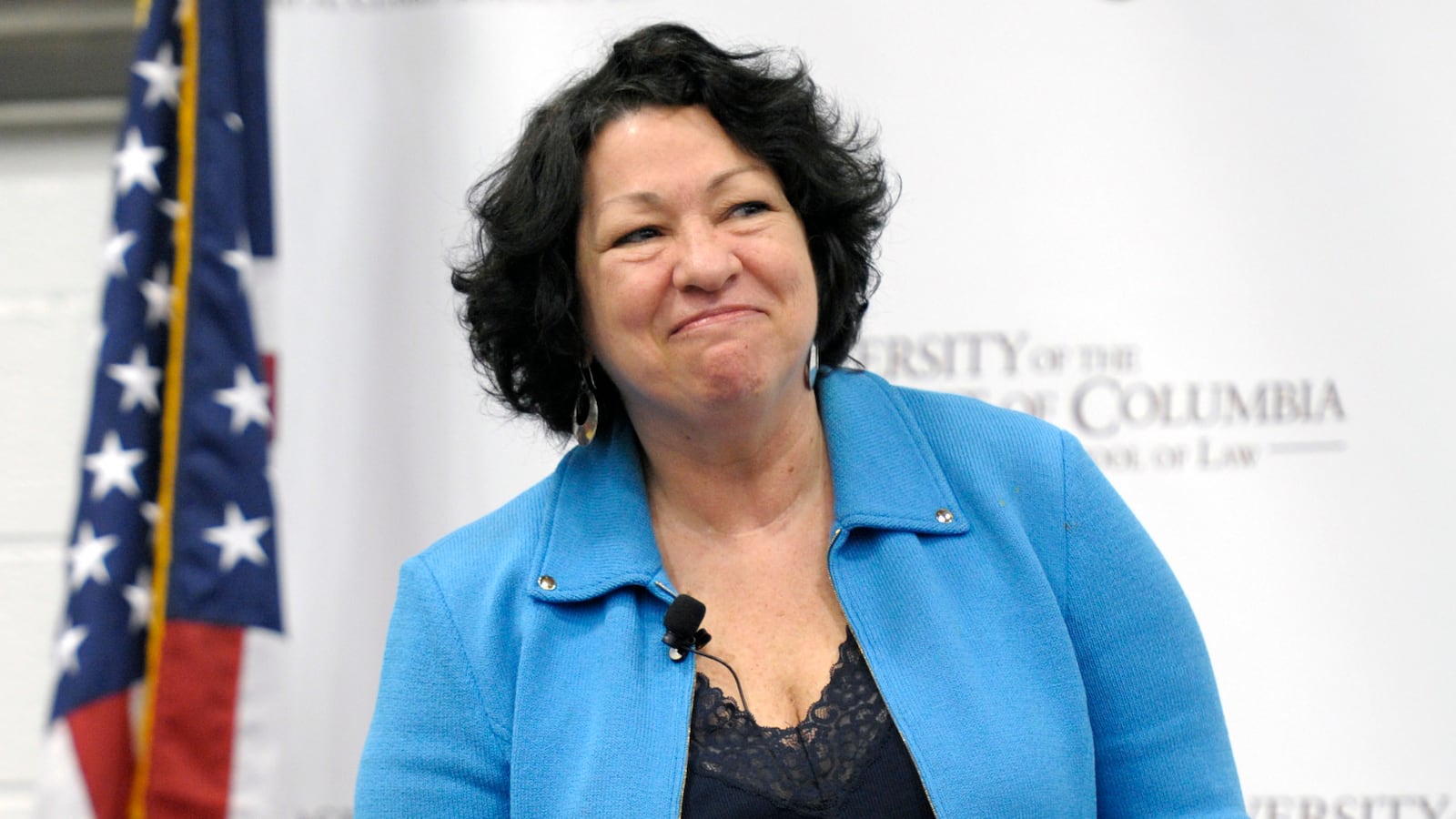The person at the center of the rags-to-riches story always follows a certain script that is expected of her: She is humble, earnest, and more often than not completely humorless. What’s refreshing about reading Sonia Sotomayor’s new memoir My Beloved World and watching her on 60 Minutes last night was the degree to which she departs from that script.
When a woman of her generation is called a “tough bitch” by a male law-firm colleague, the woman is supposed to take five kinds of predictable umbrage. Sotomayor acknowledged to CBS’s Scott Pelley that the colleague was “probably not” far off. However you feel about her politics, you have to like that.
You also, I think, couldn’t help but be moved if you watched Sotomayor and Pelley stroll through her old Bronx neighborhood in the rain and you studied the looks on the faces of people—including her NYPD security detail, wearing their nervous smiles—posing for photos with her or snapping her picture with their cell phones from their windows. The people from the hood were clearly overwhelmed to be in her presence, and why not? It’s not every day that people from a rough urban neighborhood see a Supreme Court justice walking down the street, let alone one who grew up there. In fact, until Sotomayor, this has happened roughly never.
Sotomayor is telegenic, she’s funny, she laughs at herself. And her story, as she tells it in the book, is pretty remarkable. She’s one of those interesting people, for whose presence the world is so much richer, who grew up asking “why?” from the time she could ask anything, who always said to herself: “I love these people dearly, but this life ain’t for me.”

“Conservative” doesn’t begin to describe the milieu in which she was raised. Not politically. Culturally. Her father was a stone-cold drunk. She makes no bones about it. Her mother was a nurse who worked the evening shift, mostly, Sotomayor writes, so she didn’t have to face her slobbering husband, which meant that Papi was in charge, God help us, of looking after Sonia and her little brother after school. He did manage to make them dinner every evening and even produced some delectable cooking. But as soon as the minimum obligations were accomplished, it was back to his bedroom, door shut, with his bottle.
One might have thought, when he died prematurely, that there would be some relief on top of the sadness. But no. Her paternal grandmother, her aunts, even her mother, thought it all had to be their fault. “That was how their minds worked,” she writes. “If a man did something wrong, there was a woman to blame, whether wife, mother, sister, or sister-in-law.” She sympathized, but actually not really: “I recognized that it must be horribly painful to imagine you could have stopped him but didn’t. But I also knew all that was nonsense.” For weeks after Papi’s death, her mother froze like statue. Drapes closed, no music, no laughter; finally, Sonia had enough and literally shook Mom by the lapels.

Mami—this is one of the conventional parts of the story—did stress education, and Sonia knew it was her escape hatch. Perry Mason convinced her to be a lawyer. She was accepted to nearly every college she applied to, settling on Princeton. When she got there, some girls from the dorm were sitting around as one mentioned she’d recently attended a wedding and taken the bold step of not choosing a gift from the bridal registry. “What the hell is a bridal registry? I wondered.” When as a senior she received a call from a dean congratulating her for winning the Pyne Prize, the highest academic honor given at Princeton, Sotomayor didn’t know what it was.
These stories can be retailed in a self-regarding way or a matter-of-fact one, and fortunately Sotomayor falls very much in the latter camp. She’s also not a bad writer at all. “On the beach at Luquillo, when the sun appears under clouds massed offshore and catches the coconut palms at a low angle, the leafy crowns explode like fireworks of silver light.” I’ve been to the beach at Luquillo, a not-long drive east of San Juan. That’s pretty darn good.
The “news” portion of the 60 Minutes segment concerned affirmative action. Obviously, she must have benefitted in her admissions to Princeton and Yale Law, so as the matter comes to the high court this year, Pelley tried to press her on her views. She recalled that a counselor at her high school questioned Princeton’s openness to her. “You can’t be a minority in this country,” she said, “without having someone express disapproval about affirmative action.” While she didn’t state a position, it seems fairly clear that the number of associate justices who benefitted from affirmative action personally but now believe it to be a monstrous crime will stay at one.
Sotomayor is going to emerge from this publicity run with some star power. She has personality. She doesn’t take herself too seriously, doesn’t live every minute of her public life feeling that she has to Represent something, whether Puerto Rican-ness or Professional Womanhood or anything else. She is who she is. Maybe childhood diabetes has something to do with this? There are, I’d imagine, few acts more solitary than having to inject yourself with insulin at age eight. It’s bound to make a person a unique and even tough…cookie.






